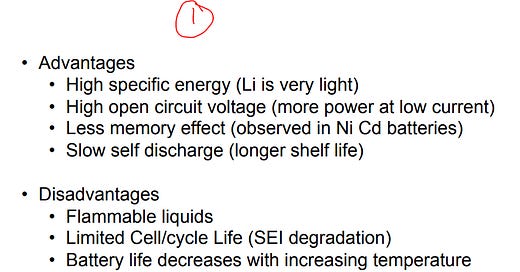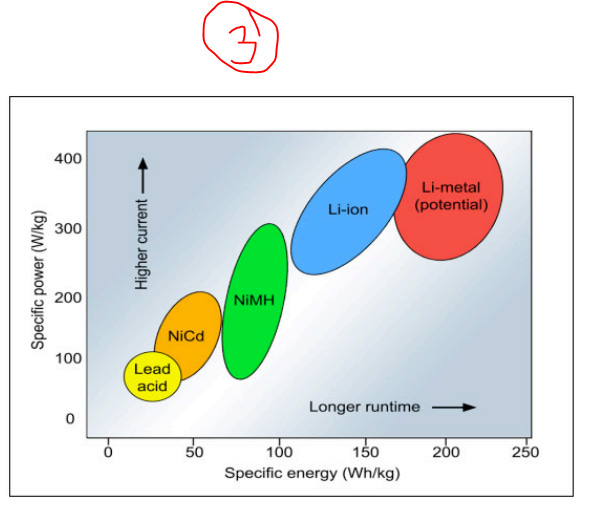Solid State Batteries Part 2. What makes a pond illegal? You can find anything from socks to dating online, now arranging to hunt on private land can be had too.
Solid State Batteries part 2: why do we use lithium in the first place (liquid or solid) and why are solid state batteries better?
Let's start with a quick look back at a question that I had when looking up things about batteries. Why did lithium ion batteries become the standard for EV's and other devices (phones frequently have them)?
I found an excellent power point presentation on both lithium and solid state batteries that I thought I'd share. It (in contrast to many things I looked at) is fairly technical but also pretty approachable. I linked it first below.
Take a look at screenshot 1. It's from this presentation and lists the advantages and disadvantages of lithium ion batteries as currently used (these would be liquid state batteries which are in EV's and etc.).
The disadvantages listed are pretty straightforward, so I won't provide any backup there, but I do want to touch on some of the advantages because they could use some more context if you're not too familiar with or have forgotten the basics of electricity.
The power in any battery (power remember is the rate at which energy can flow out of something and into another--a high value for power in a battery means it can give up lots of energy quickly) is the product of the current (how much charge is flowing out of the battery--think gallons per minute if it were water) and the voltage (how hard you push on the charges--think pressure in a water system). If you increase either current, voltage, or both you increase the power output of a battery.
So, in screenshot 1 where he talks about high open circuit voltage, what that means is that even as the current falls in a battery, lithium ions are still able to deliver more power because they push harder on the electric charges than, say, a regular car battery.
In addition, lithium ion batteries store more energy with less weight (this is what the author means by high specific energy). Think something like butter. Butter has a huge amount of calories in a tiny little bit while you can eat pounds of broccoli and still not stack up much calories. Same idea.
Lastly, the memory effect, if you're not familiar is that old problem you have with some earlier batteries where you'd have to be careful to drain them completely to prevent them taking a set; i.e. if you charged some old style batteries when still have full, you'd permanently set your battery to only hold half as much charge.
Some of these desirable properties that lithium has carry over to solid state batteries (remember the difference between newer, solid state and older liquid state batteries are mainly just that there's either a solid material or liquid material between the two poles of the battery).* This means lithium is a pretty natural choice for solid state batteries too.
To see what I mean, take a look at screenshot 2. It lists the advantages and disadvantages of solid state lithium ion batteries. They're not flammable, they don't run the risk of heating up to the point where they'd break down, the theoretical voltage is higher, and they last longer.
That's why there's money pouring in.
If you're more a picture person than a lists person, I included a graph as well. It's screenshot 3. I'll go into more details below** but the upshot is this. The further right you on the graph and the higher you are on the graph, the better battery you are. We use lithium ion liquid state batteries for EV's and etc. now because they're better than regular car batteries and better even than nickel cadmium.
Additionally, solid state lithium batteries hold the promise of outperforming the current best we have (liquid state lithium). If we could get them in EV's it would make them better, lighter, and less risky in terms of fires.
Let's wrap up.
Clearly, all other things being equal, liquid lithium ion batteries do much better than regular car batteries (lead acid): they can run longer and supply more charge. Solid state batteries, again as shown in the graph, have the potential to outperform the current state of the art lithium ion, delivering more power and more charge per kg of weight.
The only question is can they be comparable on price and performance. We'll talk some of that in the third and final installment.
*see the previous post--some of the important properties of a battery depend on the chemistry of the components and not on the design. I.e. depends on nature and not on engineers.
**this graph is kind of awkward if you don't know much about physics or batteries, but they are putting a battery's power per unit weight vs. its energy storage per unit weight. By doing per unit weight, you remove scale effects (right now solid state batteries are only on the small scale and thus would lose the race if we did absolute numbers). Recall too that power is the rate at which energy flows into or out of a system and energy is just how much is there. You could have a battery that stores a lot of energy but can't transfer it quickly (this would be far too the right, but not high on this graph) and vice versa.
https://ehcar.net/wp-content/uploads/2022/10/rapport206-1.pdf
Illegal ponds?
The article linked first below was a curious one to me. I'm new to issues related to water, and so seeing that a pond could be illegal was kind of startling to me.
In the past, I have talked with friends who are farmers and I know that it is not legal for a farmer to, say, hollow out the low spot on their ground to collect runoff/rain water which could be stored and pumped back over the crops. I didn't know that having a pond (farm or no) would be illegal, however.
Quoting the article:
"The state has completed a review of 540 ponds in the Arkansas River basin [see the attached screenshot for a map] with a total surface area of 1,260 acres. It has resulted in around 500 property owners receiving a notification from the Colorado Division of Water Resources about the illegal status of their ponds."
This effort is part of a larger, statewide effort to root out illegal ponds.
The concern here is that the pond will collect water and then some will evaporate, leaving less water to go to folks downstream (whether that's in state or out of state).
There are more details in the article to read up on, but I can't help but wonder what it is that makes a pond illegal. About all the article says on the matter is that the state is coming after ponds that (quoting) "...don't have a legal water source in the Arkansas River basin, which includes tributaries and creeks that flow into the main river."
I went to the state's pond management page to see if there was more info. The short answer to "what makes a pond illegal?" is something that causes injury to vested water rights.
Okay, simple enough to say. Is there a minimum size that causes injury? Does it matter if it's manmade or natural? Does the age matter? What happens if you buy a property from someone without realizing the pond is illegal. Do you get stuck remediating at your expense?
If anyone reading has more knowledge on this stuff than I do, please join in on the comments and help us all out. I would love to hear more!
https://www.cpr.org/2023/09/19/southern-colorado-illegal-ponds-notices-arkansas-river-basin/
https://dwr.colorado.gov/services/water-administration/pond-management-restoration-projects#:~:text=Ponds%2C%20like%20any%20water%20source,obligations%20to%20a%20downstream%20state.
Related:
An oddball thing I saw in reading up on illegal ponds.
From the state's pond management page linked below:
"Further, DWR [Division of Water Resources] staff will note that any project element exposing groundwater should not be constructed without first obtaining a well permit from DWR."
Just thought that was an interesting proviso. Brings up lots of questions for me.
What if you're digging but not after water, for example?
I would think you'd have to balance carefully being too harsh and thoughtless in applying the law with letting people get away with water mischief. Where and how to draw that line though ...
https://dwr.colorado.gov/services/water-administration/pond-management-restoration-projects#:~:text=Ponds%2C%20like%20any%20water%20source,obligations%20to%20a%20downstream%20state.
You can use apps to find nearly anything, and now you can use them to arrange for hunting too.
Saw the article below in Complete Colorado yesterday and wanted to catch you in time (if hunting's an interest) to look into this for this year.
The story below details an app that helps private land owners and hunters who'd want to hunt on that land come to arrangements prior to hunting.**
FYI and happy hunting! Details in the article.
**Not always free!
https://www.ksut.org/outdoor-recreation/2023-09-25/looking-to-hunt-or-fish-on-private-land-theres-an-app-for-that






